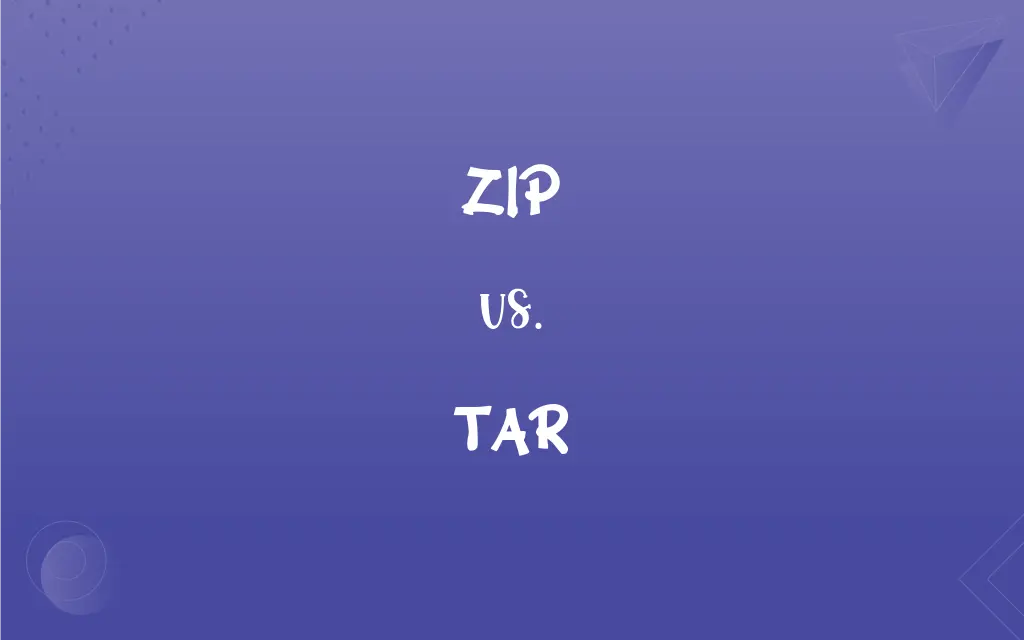ZIP vs. TAR: What's the Difference?
Edited by Aimie Carlson || By Janet White || Published on January 24, 2024
Zip is a file compression and archive format, while tar is a Unix-based file archiving tool without compression.

Key Differences
Zip is a widely used archive format known for its ability to compress individual files before archiving. It's common in Windows environments. Tar, short for tape archive, is traditionally used in Unix and Linux systems. It combines multiple files into a single archive (tarball) but doesn't compress them.
The zip format offers the convenience of compressing and archiving files simultaneously, making it popular for reducing file size and facilitating easy sharing. Tar, on the other hand, is typically used for bundling files together, and a separate compression tool like gzip is often applied to the tarball for compression.
Zip files are easily recognized by their '.zip' extension and can be created and extracted using various software across different operating systems. Tar archives, usually found with a '.tar' extension, are commonly used in software distribution and backup processes in Unix-like systems.
Another aspect where zip differs from tar is in random access. Zip files allow easy access to individual files within the archive without the need to extract everything. In contrast, tar archives require sequential access, making it less efficient to extract a single file.
Zip includes built-in support for lossless data compression algorithms, whereas tar archives require external compression tools. This makes zip more versatile for general-purpose file compression and archiving.
ADVERTISEMENT
Comparison Chart
Full Form
Zip - "Zippy" (informally)
Tar - Tape Archive
Usage in Sentences
Zip is often used as a verb (to zip files).
Tar is rarely used as a verb in common language.
Plurality
Zip can be pluralized (zips).
Tar is usually used in singular form.
Adjective Form
"Zipped" files (referring to compressed files).
"Tarred" is not commonly used in this context.
Common Phrases
"Zip it up" (referring to compressing files).
"Tarball" (referring to a group of files archived by tar).
ADVERTISEMENT
ZIP and TAR Definitions
ZIP
Zip can refer to a high-pitched sound.
The bullet zipped past.
TAR
Tar refers to coating with tar.
The roof was tarred to prevent leaks.
ZIP
Zip can mean to move quickly.
He zipped through the crowd.
TAR
Tar represents blame or disgrace.
He became the tar of the community.
ZIP
In computing, zip means to compress files.
Zip the files before emailing.
TAR
In slang, tar can refer to a sailor.
Old tars shared their sea stories.
ZIP
Zip can mean energy or vigor.
She's full of zip today.
TAR
Tar is a black, sticky substance used in road-making.
The workers spread tar on the road.
ZIP
To compress (one or more computer files) into a single and often smaller file, especially one in the ZIP format.
TAR
Tar can mean to smear reputation.
He was unfairly tarred by the scandal.
ZIP
A zip is a device for fastening clothes.
Please zip up your jacket.
TAR
(computing) A program for archiving files, common on Unix systems.
TAR
(computing) A file produced by such a program.
TAR
To create a tar archive.
FAQs
How is tar used in computing?
Tar is used to combine multiple files into a single archive file, often for easier distribution or backup.
Can zip files be password protected?
Yes, zip files can be encrypted with a password for added security.
Is tar inherently a compression tool?
No, tar itself doesn't compress files; it's often used with compression tools like gzip.
Do all operating systems support zip?
Yes, zip files are universally supported across various operating systems.
What is the main advantage of tar over zip in Linux?
Tar is more efficient for bundling many files without compression, which is common in Linux environments.
Is tar commonly used in Windows?
Tar is less common in Windows and more prevalent in Unix/Linux systems.
What is a zip file?
A zip file is a compressed archive that can contain one or more files or directories.
What is a tarball?
A tarball is a colloquial term for a file created by tar, often compressed with gzip or bzip2.
Is zip compression lossy or lossless?
Zip compression is lossless, meaning it doesn't reduce the quality of the files.
Why is zip more popular than tar in general usage?
Zip's widespread support and integrated compression make it more user-friendly for general use.
Can zip handle large files efficiently?
Zip can compress large files but might be less efficient compared to other formats for very large files.
Are zip files safe from viruses?
Zip files can contain viruses, so it's important to scan them with antivirus software.
Can tar archives include directories?
Yes, tar can archive entire directories and their contents.
How do I create a zip file?
You can create a zip file using file compression software or built-in operating system features.
Can zip archives be split into multiple files?
Yes, large zip archives can be split into smaller, manageable files.
Is tar suitable for incremental backups?
Yes, tar can be used for incremental backups, storing only changed files.
Do zip and tar preserve file permissions?
Tar preserves file permissions, but zip may not always retain them accurately.
Can I convert a tar archive to zip?
Yes, tar archives can be converted to zip format using file conversion tools.
Can I open tar files on a Mac?
Yes, macOS can extract tar files natively or with additional software.
Does tar support encryption like zip?
Tar itself doesn't support encryption, but it can be used with encryption tools.
About Author
Written by
Janet WhiteJanet White has been an esteemed writer and blogger for Difference Wiki. Holding a Master's degree in Science and Medical Journalism from the prestigious Boston University, she has consistently demonstrated her expertise and passion for her field. When she's not immersed in her work, Janet relishes her time exercising, delving into a good book, and cherishing moments with friends and family.
Edited by
Aimie CarlsonAimie Carlson, holding a master's degree in English literature, is a fervent English language enthusiast. She lends her writing talents to Difference Wiki, a prominent website that specializes in comparisons, offering readers insightful analyses that both captivate and inform.































































